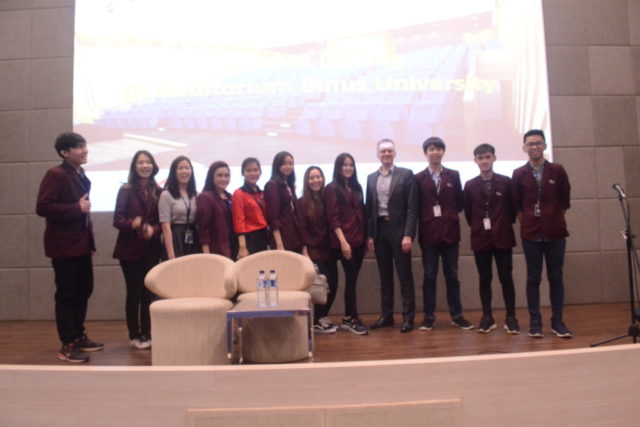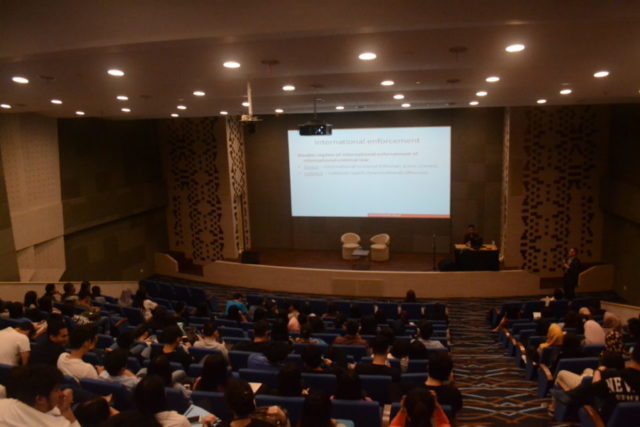INTERNATIONAL SEMINAR – “HATE CRIMES: INTERNATIONAL AND COMPARATIVE LAW STUDY”

On Wednesday, 24 May 2017. The International Business Management Department held a seminar entitled “Hate Crimes: International and Comparative Law Study”.The seminar was held at Auditorium of BINUS Alam Sutera Campus, Started at 09.00 and ended at 11.00 WIB.
The speaker at this seminar, Mr. Mateusz Woinski, PhD, From the famous University of Poland, Kozminski University, and guided by Ms. Respati BINUS University lecturer as Moderator, this seminar event went very well and memorable for the students that attend.
The event begins with an opening by Moderator to Welcome today seminar speaker, Mr
Mateusz Woinski, He is the Vice-Director of College of Law at Kozminski University and also a lawyer.
The aim of the seminar is to provide the audience with knowledge about what hate speech and hate crimes are, the definition of it and the example. The International and EU legal instruments concerning human rights protection as well as international and EU obligations to criminalize certain acts of racism and xenophobia. How do the states (e.g. USA, Spain, Germany and Poland) fulfill the obligations in the field of criminal law. What kind of problems arise in both theoretical and practical dimensions.
The speaker then explains that there is a force of impenetrable rule of law, the rule is normative system ascertained by the power (force) of state authority, Where there are some Different levels of legislation and the different methods of achieving goals. Mr Mateusz Woinski then said that “The most important question that arises when talking about the criminal law measures is whether it is based on the principle ultima ratio of criminal law”.
Mr. Mateusz Woinski explains Law as a method itself, he said “The problem that arises in relation to criminal law provisions is its lacking in precision Whosoever steals by means of a break-in (breaking and entering)” . Then he begin to ask the audience’s opinion (given case) by giving the audiences choices. The speaker briefly explains about European Union “The EU has developed an internal single market through a standardized system of laws that apply in all member states. EU policies aim to ensure the free movement of people, goods, services, and capital within the internal market, enact legislation in justice and home affairs, and maintain common policies on e.g. trade and agriculture”
“Let’s focus on one example of Globalization of criminal law, Cybercrime” The speaker said. Convention on Cybercrime, Budapest, 23 November 2001. Resulted in a treaty open for signature by the member States and the non-member States which have participated in its elaboration and for accession by other non-member States. The speaker explains that The Convention is the first international treaty on crimes committed via the Internet and other computer networks, dealing with a broad scope of acts, particularly with such phenomena as: infringements of copyright, computer-related fraud, child pornography and violations of network security. And It also contains a series of powers and procedures such as the search of computer networks and interception. Its main objective, set out in the preamble, is to pursue a common criminal policy aimed at the protection of society against cybercrime, especially by adopting appropriate legislation and fostering international co-operation.
Then the speaker mention about States that participating in Budapest Convention, There are 39 states ratified/ acceded (35 European, Australia, Dominican Republic, Japan, USA), 11 states are signed (9 European , Canada, South Africa), and 8 states that invited to accede (Argentina, Chile, Costa Rica, Mexico, Morocco, Panama, Philippines, Senegal).
The next issues that the speaker explains is Development of human rights protection movement.
“In consequence the very same behavior might be covered (at least at the first glance) by human rights protection provisions as well as by pro-criminalization obligations (and therefore by criminal law).”
“This is the place where a conflict of laws might occur – and occurs; the question is whether this is a no-man’s land or an every-man’s land.”
Then Mr Mateusz Woinski, begin to ask the audience’s opinion about some some pictures given by the speaker Concerning human rights issues that has occurred. The speaker said that “The problem that we have in such cases is: has an individual crossed the border between the freedom of expression and the abuse of this freedom?”. Then he explain that The most important cases – from the perspective of a society as a whole – are related to the phenomena of racism, xenophobia, affecting religious feelings etc, Not only the ‚ speech’ itself can be deemed as a crime, but also: images, symbols, body language, gesture etc.
“In other words, the biggest problem we might have is related to so called hate speech.”
Due to time constraints, The speaker completed the topic and continued by the moderator to conclude today’s seminar. Then the event end at 11.00 pm.
The seminar runs very well, the seminar provides new information for students about International Law Studies and hate crimes that occur in the world. The seminar also managed to inspire students to be more aware of the study of international law and how hatred took place and cause crime in the world. (BIC)


Comments :